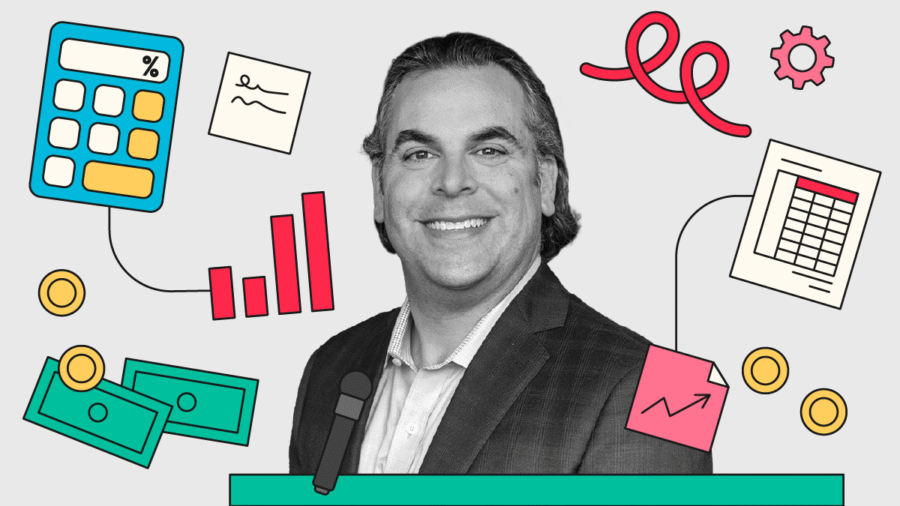
Evan Goldstein has always been interested in how ideas develop into successful businesses. And he’s maintained this curiosity throughout his career, starting as a financial analyst at Ford Motor Company and progressing through leadership positions at Genentech and Salesforce. Since 2022, he has served as CFO at Seismic, an AI-powered sales-enablement platform.
Goldstein has many responsibilities at Seismic. Naturally, he oversees all of the company’s financial operations, from accounting and financial planning to deal operations and procurement. But he also leads the legal and information security teams and works closely with the product teams to ensure tech compliance across the firm’s platforms. What Goldstein enjoys most about being a leader, however, is mentoring others and watching them succeed.
Here, he discusses his approach to leading teams, his passion for turning simple ideas into successful business products and his love for learning about cars and listening to Taylor Swift with his two kids.
How did you become a CFO?
I’ve always been fascinated by how ideas become commercially viable. Whether it’s launching a new product or investing in a go-to-market organisation, I’m always thinking about this; my brain works that way. For example, I once asked my hairdresser how stylists determine the right time to open their own salon simply because I wanted to understand the business side of it.
When I graduated from university in the late 1990s, there were three paths in finance: investment banking, consulting or going in-house at a company. I chose to go in-house because I wanted to be part of something as it developed. My first job out of university was at Ford Motor Company. Even on bad days, I’d go down to Clay Studios to see the next-generation Mustang or F-150 to remind myself why I wanted to work in business.
What skills or traits does a good finance leader need?
I think it changes over time. Early in your career, it’s all about understanding data. You might not have much influence yet, but, if you know the details and can explain the story behind the numbers, people start to listen to you and that data gives you authority.
As you move into management, you become responsible for enabling others. Later, as a leader, it’s less about speaking first and more about asking questions. I used to think whoever spoke first was the leader, but I’ve learned it’s more important to listen and ask questions. When I’m in a meeting, I don’t have to be the first to speak. Instead, I work to enable others and help them think things through.
What excites you most about your current role?
I always wanted to be a CFO, so I took roles I thought would prepare me for the post. What excites me is figuring out how to make a successful business. But, even more than that, I love leading people.
There are about 10 to 15 people I’ve worked with whom I still talk to every quarter. Some of them have become CFOs themselves. Seeing the people I’ve worked with succeed is what excites me most about being a leader.
What single thing do you think would make your job easier?
Better training and development for staff. In fast-moving companies like Salesforce, you often learn on the job, but it’s also important to take classes and keep improving your skills. Managers need to explain the reasons behind how things work because that helps teams improve.
When I was growing up, my father encouraged me to find answers myself instead of just giving me solutions. It taught me the lesson behind that old adage about giving a man a fish versus teaching a man to fish. Teaching people to solve problems on their own is what’s important. Helping others learn and develop makes organisations more effective.
What is the best bit of business advice you’ve ever received?
Not to be shortsighted. When you’re in a fast-growing company, it’s easy to focus only on the problem right in front of you. Now, before making decisions, I try to pause and think several steps ahead.
You’ve got to be able to see the forest through the trees. By considering different possibilities, you can make better decisions.
Which book do you think every finance leader should read at least once?
Influence Without Authority by Allan Cohen and David Bradford. I’ve read it a few times. It’s about how to influence change in an organisation when you don’t have direct control.
One concept that stood out to me is thinking of influence like an exchange rate. You need to understand what’s important to others so you can connect your goals to theirs. That book had a strong impact on my development as a leader.
What do you do outside work to protect yourself from burnout?
Balancing family and work is something I still struggle with. I have a 14-year-old daughter and an 11-year-old son and I spend a lot of time with them outside of work.
I prioritise experiences with my children rather than physical goods. My daughter and I are fans of Taylor Swift, so we go to concerts together. As for my son, we share a passion for cars. We go on drives, visit car hangouts and talk about cars. Cars are a big hobby for me – driving them, reading about them and going to car shows. I’m also a big college basketball fan.
What’s been your proudest achievement in your current role?
My proudest achievement has been seeing people I’ve worked with become successful. Some have gone on to be CFOs at public or private companies and others have found different paths they’re happy with.
For example, I hired someone right out of university who’s now the CFO of a cloud company. Another person told me she didn’t want to stay in finance and, after much discussion, she started her own consulting business.
To me, your legacy isn’t what you built at a company, it’s really about what you impart to others.
If you weren’t a CFO what would you like to do?
I’d definitely be doing something in the car industry. I’m not sure exactly what – maybe car design since I used to draw and paint a lot. I’ve even tried racing cars. Or maybe I’d spend time around cars, talking with people about them.
One day, if I’m ever incredibly financially successful, I could buy some car dealerships. Whatever it would be, it would definitely be something in the automotive world.

Evan Goldstein has always been interested in how ideas develop into successful businesses. And he's maintained this curiosity throughout his career, starting as a financial analyst at Ford Motor Company and progressing through leadership positions at Genentech and Salesforce. Since 2022, he has served as CFO at Seismic, an AI-powered sales-enablement platform.
Goldstein has many responsibilities at Seismic. Naturally, he oversees all of the company's financial operations, from accounting and financial planning to deal operations and procurement. But he also leads the legal and information security teams and works closely with the product teams to ensure tech compliance across the firm's platforms. What Goldstein enjoys most about being a leader, however, is mentoring others and watching them succeed.
Here, he discusses his approach to leading teams, his passion for turning simple ideas into successful business products and his love for learning about cars and listening to Taylor Swift with his two kids.





